
Tapping the potential of knowledge management to efficiently run impactful events
Event management has been a significant part of my two-decade career where I have held both leading and supporting roles. My journey began with event marketing sales where I conceptualised and executed venue and product launches. I then transitioned into a public relations role for one of the world’s premier airshows, maritime exhibitions, and conferences. Currently, I am managing events that centre around research and education. From my observations, I find that knowledge management (KM) holds the key to making a positive impact on the organisation of events.
The meetings, incentives, conferences and exhibitions (MICE) industry has evolved through the years, innovatively incorporating new technologies and strategically adapting to societal shifts and market demands.
The recent COVID-19 pandemic has proven the resilience of the sector in adapting to the dynamic changes of the market landscape in the face of business closure.
In a survey conducted in 2020 by the #SaveEventsSG movement of more than 170 event organisers and suppliers, as reported by TTGmice1, 70 per cent of event businesses in Singapore have experienced a 90 per cent drop in revenue during the pandemic. It resulted in a series of cost-cutting measures, including staff pay cuts, no-pay leave, and temporary business closures.
Within that same year, a pilot programme2 initiated by the Singapore Tourism Board saw 29 MICE events held in the country in hybrid format, reimagining a new way of running events that caters to both local and international attendees. The event industry bounced back in no time.
The core business of the event industry is to bring people together for various purposes. It is an influential tool to engage audiences, creating a space for networking and the opportunity to reinforce brand awareness.
The events industry is typically fast-paced and highly competitive where having a track record of creating new experiences is most sought after. Event organisers rely on a pool of consultants, contractors, and volunteers to support the core event organisers in executing their plan.
An effective use of KM can optimise the available resources and streamline processes, leading to more time to brainstorm creative ideas, which could result in impactful events that elevate the experiences of the attendees.
The role of knowledge management in event planning
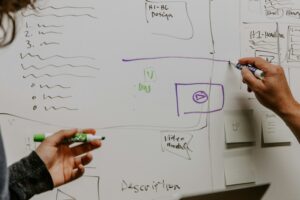
KM is the capturing, organising, and sharing of acquired knowledge whether in the work team or within the organisation. Serban and Luan explained it as3 “the systematic and organised approach of organisations to manipulate and take advantage of both explicit and tacit knowledge, which in turn leads to the creation of new knowledge”. The efficient use of resources and optimisation of processes will allow the team to be aligned with project developments, enabling informed decision-making and swiftly addressing bottlenecks.
Event planning is more than logistic and operational coordination. It involves experts in varied fields collaborating on wide-ranging matters such as venue suitability, programme creation, IT infrastructure, marketing, exhibitors’ engagement, and security, to name a few. With a diverse pool of professionals coming together with their own experience, areas of expertise and unique insights, a KM model and framework will help the team manage their collective knowledge effectively and efficiently.
Zhou elaborated4, “Knowledge management has been identified as a conscious strategy to help event organisations stay innovative and competitive in the long term. It is essential to transfer the proper knowledge to the right people at the right time and to put the learning into practice”.
Tips on integrating knowledge management to create impactful events
a. Sharing sessions with past event organising committee members
Minimise knowledge leaks by holding sharing sessions with past committee members before embarking on another event project. In this way, experiences of past committee members are captured and knowledge acquired by new appointees. These sessions are typically informal, allowing the new appointees to pick up on the nuances that would be difficult to identify by reading manuals and documents. It allows questions to be addressed in real-time and establishes rapport and a sense of camaraderie among the new committee members who will be embarking on the event project.
b. Regular meet-ups and check-ins with committee members
Conduct regular meetings with committee members to maintain effective communication so that they are kept informed of the project’s developments and progress. Schedules and deadlines are important in organising events so this platform provides committee members the opportunity to share their insights and air the challenges, encouraging open dialogues that build a more cohesive and knowledgeable team. The platform also provides better understanding of the project’s progress, and the organisation can strategically deploy resources to help move the project forward.
c. Real-time sharing of information
In the fast-paced and dynamic environment of event planning, where quick decision-making is needed, suitable KM platforms that provides the agility to share immediate and transparent information give the committee the ability to respond promptly to unforeseen circumstances and adjust their plan. During the execution of the event, where committee members are on the ground, instant messaging allows for seamless communications between multiple parties. Problems become a shared responsibility for the committee to solve, leading to experiential learning and adding to the collective knowledge of the team. The KM platforms also serve as documentation for reference for future projects.
d. Knowledge management policy
KM Policy provides guidelines on how the committee should operate in support of its KM strategy. The policy should provide a framework for how the committee governs knowledge that is identified, documented, and shared within the committee and its working crew. A well-structured policy that simplifies what ought to be codified and makes this accumulated knowledge accessible enhances informed decision-making, reduces time needed to acquire information and encourages collaboration. When the committee is confident about the KM policy, they will not view it as cumbersome to share their expertise and experience which lead to a culture of continuous learning and innovative discoveries.
e. Documentation
It will be overwhelming to codify all the information, so the committee will need to identify the information that is of value to its members and set up processes to collect, store and have this information readily available and presented in a form that is understandable to its members. Templates in a variety of formats, such as forms, meeting minutes, video recordings, insights, checklists, and FAQs can be introduced to ensure that the information are recorded in a consistent manner while maintaining its quality. It is also important to emphasise that documenting information and knowledge acquired keeps the depository up-to-date and relevant so that it is trustworthy to refer to when decision-making is needed quickly instead of having to consult various sources to confirm the information. As manpower might change over time, documentation provides continuity and prevents knowledge loss when a committee member is replaced, and helps to reduce the knowledge gap when a new member has to catch up on the new responsibilities.
f. Managing outsourced manpower – temporary, part-time and volunteer
The events industry is a dynamic ecosystem that comprises many players. Aside from the core event organisers, it also involves temporary and part-time workers, as well as volunteers who are recruited for a specific duration. Most are not privy to the planning behind the scenes but they play a vital role in ensuring the seamless execution of the event. Their roles, from setting up the event venue, processing registrations, and managing crowd control are public-facing and influential to the public perception of the event and the overall success of the event.
Orientations, onboarding processes, regular briefings, and check-ins emphasises knowledge transfer between committee members and the event support group. It also serves to record their insights and the possibility of incorporating their valuable experiences into handing unexpected issues that typically occur in the events industry. Continuous contribution to the knowledge repository minimises knowledge loss for the benefit of current committee members and future projects. Volunteers, are in general, a pool of people who identify with the objectives of the event and dedicated their time and skills for the opportunity to be a part of the event. Committees should bear in mind that training for volunteers should be accessible and supported with a guidebook, as they are offering their time and skills without compensation. Recognising their efforts through feedback sessions and an acknowledgement programme encourages knowledge sharing and serves as an avenue to capture their tacit knowledge. Maintaining rapport and continuous engagement with these groups will benefit the committee members in the long run should they continue to respond encouragingly to future recruitment drives, as they would have retained the expertise of supporting such events.
The extent of knowledge management’s impact
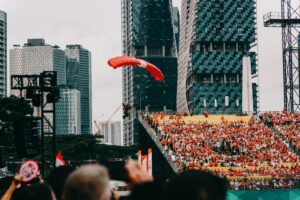
The most recent 2023 edition of the Singapore National Day Parade is an example of how the event organising committee strategically tapped on an innovative platform provided by Esri Singapore to enhance its event management strategy. The platform, according to ASEAN Technology & Security5, uses a Geographic Information Systems collaborating platform called “Joint Planning Tool” to plan and coordinate activities for an event that attracted more than 25,000 attendees. This platform6 captured insights and feedback in real-time and allowed partner agencies to “access and share plans, foster a common understanding of unfolding situations, and enhance operational efficiency and productivity.”
While KM is not commonly associated with event management, the ever-evolving nature of the event industry indicates that it will greatly benefit from the untapped potential in KM practices. From the initial planning stages to the coordination efforts and enhancement of the decision-making process, these aspects can be streamlined and elevated through effective implementation of a KM strategy, policy and framework. Gaining the trust and support of the event company leadership, along with investment in resources such as time and funds, will have a far-reaching impact. It contributes to a culture that recognises the importance of KM and enables its strategic utilisation to gain a competitive edge in a fast-paced and dynamic events industry.
Our lecturer Rajesh Dhillon, one of the leading experts in the field of KM, weighted in on the areas covered above. He observed that there are several strategies in action: a. ensuring that the organisation has a centralised digital platform for storing and sharing event-related knowledge incorporating past data including from external parties (vendors, consultants), b. lessons learned (AARs) and feedback from the planning team and event attendees are recorded and that the committee starts with a planned retrospect to have the whole team aligned with the event objectives and goal, c. making process improvements, and d. mitigate risks.
As the article highlighted how KM is an influential tool in organising impactful events, Mr Dhillon offered insights into measuring impact through internal (I) and external (E) efficiency metrics. Internal efficiency metrics include the time saved and if the new processes that were implemented worked, Innovative metrics such as the introduction of technology enhancements, ideas adopted into processes and Performance indicators liked improvements made by the event team. External efficiency metrics include feedback by attendees, responding to customers’ insights by making adjustment to the event plan thus increasing the level the engagement, and the overall event success rate. Additionally, the committee should review the knowledge sharing metric to measure the levels of engagement in KM activities such as online conversations and the number of active users. Financial metrics, typically a priority for leadership, for measuring impact include cost savings and Return on investment (ROI).
It is important for leadership to have a comprehensive understanding of KM and the strategic benefits that it could contribute. To secure support from leadership, it is crucial to emphasise the integral role KM plays in achieving operational efficiency, fostering innovation, improving quality and satisfaction, enhancing engagement, and delivering financial benefits.
Article source: Adapted from Tapping the potential of Knowledge Management to efficiently run impactful events, prepared as part of the requirements for completion of course KM6304 Knowledge Management Strategies and Policies in the Nanyang Technological University Singapore Master of Science in Knowledge Management (KM).
Header image source: Tony Pham on Unsplash.
References:
- Arena, L. (2020, May 19). Industry survey highlights coronavirus impact on Singapore events. TTGmice. ↩
- Singapore Tourism Board. (n.d.). Singapore’s tourism sector emerges from 2020 with greater resilience and reinvention (Media release). ↩
- Serban, A. M., & Luan, J. (2002). Overview of Knowledge Management. New Directions for Institutional Research, 2002(113), 5-16. ↩
- Zhou, J. (2023). Systematic Review for Knowledge Transfer at International Sport Mega-Events. Sustainability, 15(6), 4902. ↩
- ASEAN. (2023, August 1). Geographic info systems powers National Day parade. ASEAN Technology & Security. ↩
- Esri Singapore. (2023, August 9). World-leading real-time location intelligence powers the National Day Parade 2023 (Media release). ↩


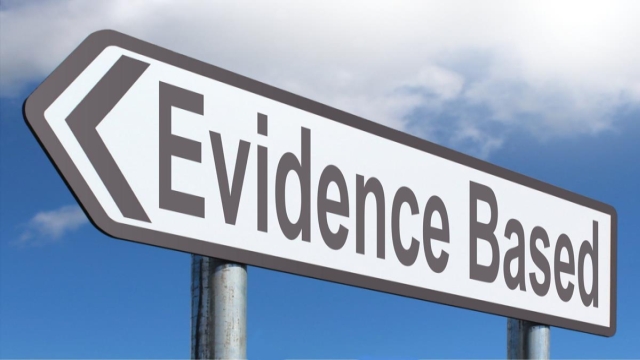
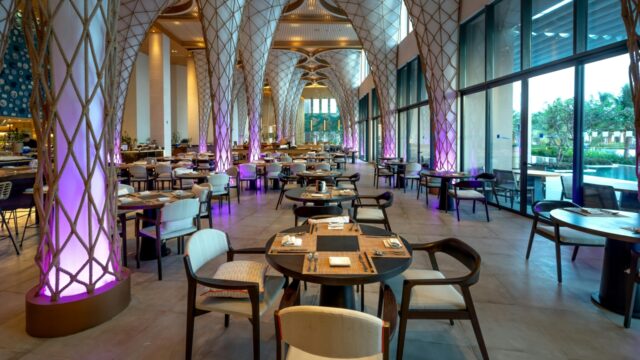
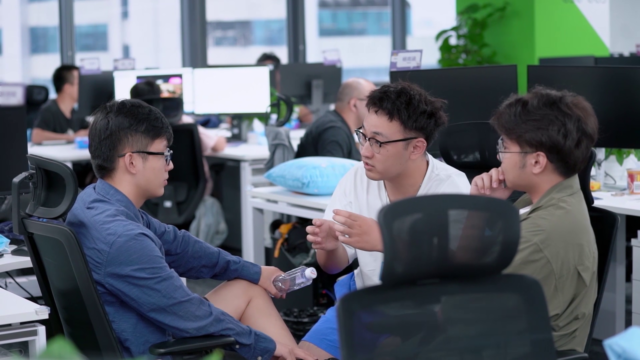



Mariam, your insights on the importance of KM in event planning are spot-on. It’s crucial in today’s fast-paced environment, especially with the challenges and changes we’ve seen recently. From my experience, Organizational Network Analysis (ONA) can help by mapping out how information flows between people, making KM even more effective. How do you think ONA could further enhance KM in event management?